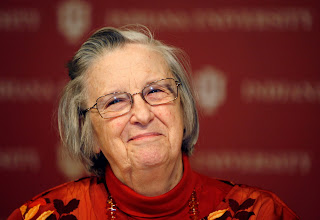Elinor Ostrom
Elinor Ostrom, popularly known as a political economist was born in Los Angeles CA in August 1933, and passed away June 2012 in Indiana Bloomington. After completing her bachelors degree in political science at UCLA, she proceeded to complete her PHD in the same field. She spent most of her life at the political science department in Indiana University, Bloomington where she started off as a visiting professor in 1965, then finally because the department chair in 1980. In 2009, she was awarded a noble prize for "her analysis of economic governance, especially the commons". Her research focused on proving the importance of the commons around the world, as it answers the popular theories that proves the tragedy of the commons". Part of her work was establishing eight principles for how commons can be governed sustainably and equitably in a community. Till date, she remains the first and only woman to win the noble prize in Economics. She is also known to have appeared on Time magazine's list of the 100 most influential people in the world.
I believe that Mrs Ostrom is important because her work plays a vital role in helping us understand a fundamental economics problem about how people manage resources held in common. I believe that some of her studies which were conducted in a behavioral experiment corresponds with some of the concepts that might be addressed in this class. For example, the topic on gift exchange, and the good citizen we talked about last class. Before now, I had not heard about Elinor Ostrom, but I am happy that I was assigned this alias name because her impact as a woman is highly significant, and it motivates me!
Additional resources:
http://www.onthecommons.org/magazine/elinor-ostroms-8-principles-managing-commmons
http://www.economist.com/node/21557717
http://www.econlib.org/library/Enc/bios/Ostrom.html

Elinor Ostrom shared the Nobel Prize for Economics with Oliver Williamson. Both of them did research on how governance of organizations can improve organizational performance. But in our class we'll give Williamson more attention because he has always been in an economics departments and economists are a little slow to acknowledge the work of political scientists, even while there is much overlap between the two fields.
ReplyDeleteFor example, some of my early published work was submitted to the Bell Journal of Economics, which when ATT was broken up became the Rand Journal of Economics. Williamson was the editor of the Journal at the time. I am less familiar with the work of Ostrom because of the division I mentioned above.